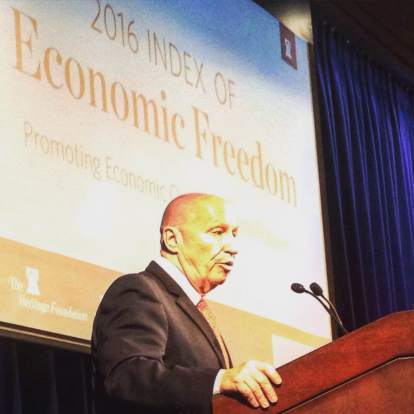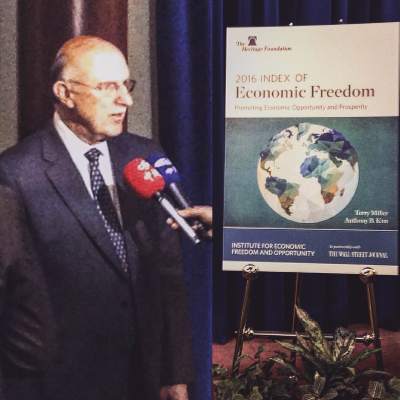WASHINGTON – Global averages for economic freedom are at an all-time high according to the 2016 Index of Economic Freedom released on Feb. 1 by the Heritage Foundation.
“It reinforces what we all believe, that the free market system has lifted millions of people out of poverty around the world, and does more than any government program to move people out of poverty,” said Jim DeMint, who became president of the conservative think tank after resigning as senator to South Carolina in 2012. “It’s gratifying to see overall global progress in advancing economic freedom reflected in these raising scores in dozens of countries.”
Beginning in 1995, the publication quantifies economic freedoms by measuring a nation’s rule of law, government size, regulatory efficiency and open markets capable of attracting foreign investment. Oftentimes the compilation of data reinforces the conservative ideology that free market-based economies are more prosperous, experience less poverty, have cleaner environments and higher levels of food stability compared to isolated (non-capitalistic) economies.
Although president DeMint began the ceremony on an optimistic note, the gears shifted upon mentioning the U.S.’s current status as a “mostly free” economy ranked at 11th out of 178.
“We are performing far below our potential with individuals, families and entrepreneurs being squeezed by the growth of big government and bureaucracy and regulations,” DeMint said. “This should greatly concern every American who wants their children to grow up in a country that’s more prosperous than the one we grew up in.”
Congressman Kevin Brady (R-Texas) of the U.S. House of Representatives shared a similar sentiment, expressing concern over the U.S.’s present ranking in today’s complex global economy.

“The thought that the people of Hong Kong, Ireland and Canada have more power to work, produce, consume, own, trade and invest according to their own personal choices than Americans is just wrong,” said Brady. “‘We are number eleven’ isn’t the motto of this great nation.”
Being the Chairman of the House Ways and Means Committee, Rep. Brady is at the forefront of financial reform within the House of Representatives. His critiques on the Obama Administration became apparent after he reminded the audience that the U.S. ranked at six when Obama first took office.
“Over seven years of higher taxes and bigger government have made it harder for millions of Americans to achieve and provide for their family,” said Rep. Brady. “We have experienced the most disappointing economic recovery in half a century.”
Today the U.S. has the highest statutory corporate tax rate (re: before deductions) among developed nations at 39 percent, according to politifact.com. Even though Congressman Brady believes this rate impedes foreign investment and influences American companies to relocate overseas, he considers another overarching problem to be of the utmost importance.
“The biggest challenge to fixing our broken tax code isn’t the policy, and it isn’t the politics,” said Rep. Brady. “Our biggest challenge is that Americans have given up hope that we will ever do it, and that changes today.”
Due to his committee’s constitutional authority to rectify the U.S.’s complex tax code, though, Rep. Brady promised the audience to draft new legislative measures that will remedy “a hole in our economy the size of Canada’s economy.”
“We have a choice: we can continue the status quo or we can change,” said Rep. Brady. “I think it’s time we learn from the failed policies of the past and move forward with a bold pro-growth agenda that gets people back to work that gives them that freedom. People across the country need to hear that conservative ideas like lower tax rates and smaller government and expanded freedom to trade will make it easier for them to find good jobs and improve their lives.”
After Congressman Brady completed his speech, former U.S. Ambassador to the United Nations Terry Miller discussed the results of the 2016 Index of Economic Freedoms more in depth. Particularly he praised Hong Kong, Singapore, New Zealand, Switzerland and Australia for their top-notch economic performances, in addition to recognizing regional leaders such as Chile in Latin America and Bahrain in the Middle East.

“These countries all have extraordinary levels of openness to international trade, they are all open to flows of international investment, they all have durable and stabile rule of law, and low-levels of corruption in their economy,” said Ambassador Miller. “They are really by far the best performers in our index. It’s not even close once you get beyond these five.”
On the opposite side of the spectrum, countries such as North Korea, Cuba, Venezuela, Cuba, Zimbabwe, Turkmenistan and Eritrea compiled the five worst-performing economies.
As the event wrapped up, Ambassador Miller was torn about the U.S.’s digression from a “free” to “partly free” economy within a span of six years. He attributed the decline to decreased fiscal freedom from higher tax rates and increased government spending on expenditures like the Affordable Health Care Act.
“It’s really galling for me to say that, but there it is,” said Ambassador Miller. “I don’t know whether to be outraged or embarrassed- I’m a little bit of both.”